Syed Zain Al-mahmood
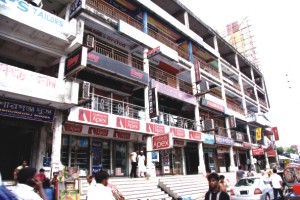 |
A spate of brazen robberies have raised concern. |
Liton (not his real name) was only 14 when he had his first brush with the law. Detained by the police for picking pockets in Gulistan, he spent six months at a juvenile correctional facility in Tongi. Back out on the streets, he soon rejoined his partners in petty crime. By the time he was 16 Liton had graduated to mugging and bag-snatching. He has been caught several times, and on one occasion received a severe beating by a mob. After his latest arrest for being part of a “molom party” -- a gang that rubs toxic ointment into their victims' eyes before robbing them -- he has vowed to go straight. But even Liton doesn't know how long he can remain on the right side of the law.
“It's easy to say go and work. I have been pulling a rickshaw for a while, but it's hard work. I can't find anything better to do. But when I'm working (as a mugger) it's possible to get Tk. 500 with one Khep (criminal operation).”
Liton claims many transport workers and rickshaw pullers double as muggers at night. Says Liton, “mugging and snatching is easy in Dhaka.”
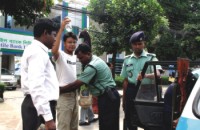 |
| The police are increasing patrols and check posts in an effort to combat spiralling street crime. |
That fact was brought home last month when a slew of muggings and holdups rocked the capital. Some of the incidents happened in broad daylight. On July 8 armed muggers snatched over Tk 3.70 lakh after shooting at an official of a pharmaceutical company on Ring Road in the city's Shyamoli area. In another incident, muggers shot at the manager of a non-governmental organisation but failed to take his money in South Keraniganj. On July 9 muggers snatched Tk 14 lakh from two men in the business district of Motijheel minutes after they left a money exchange. In a separate incident muggers shot a scrap trader and took away cash and a mobile phone set from him in the city's Golapbagh area. In another disturbing development, several cars were stolen from the Gulshan and Dhanmondi areas, prompting the police to request owners to be careful while hiring drivers.
The spate of brazen attacks has attracted attention, but many incidents of mugging and snatching that occur regularly in Dhaka go unreported. According to data provided by the Dhaka Metropolitan Police, there were 113 registered cases of muggings in the capital during May and June. Observers suggest the actual figure could be several times as high. In most cases, the hapless victims do not bother going to the police.
In the early hours of August 5, Siraj Syed arrived at Dhaka's Sayedabad bus terminal on a bus from Comilla. He got into a CNG auto rickshaw in order to get to his house in Mirpur. Halfway there, the auto rickshaw suddenly stopped at a secluded spot. The driver started to gun the engine, but the vehicle would not move.
“As soon as the CNG stopped, I knew something was wrong,” says Syed. “I wanted to get out, but before I could make a move, three men piled in. Two of them held knives at the ready. I didn't stand a chance. As soon as the muggers got in, the driver started the engine and the CNG sped away.”
 |
 |
| Taxicabs and auto rickshaws are often used by muggers after darkness falls. |
Young people carrying small high value items such as mobiles and iPods are frequent targets. |
One of the men got on Syed's lap, pinning him against the seat. The muggers took away his wallet, mobile phone and PDA. He was pushed out of the auto rickshaw near Bijoy Sarani.
“I lost things worth quite a bit of money,” says Syed, “but in a way I am thankful. They didn't harm me physically.”
 |
| Many streets become a mugger's paradise at night. |
Absar Uddin, a 35-year-old trader in Banani, wasn't so lucky. He had just drawn some money from an ATM on Road 11 in Banani when a black taxicab stopped in front of him.
“I asked him if he wanted to go to Uttara,” recalls Absar. “Normally they don't want to go, or haggle about the fare. But this guy just said, get in!”
“I was talking to a friend on my mobile and was a little preoccupied. After we had passed Hotel Radisson, the taxi suddenly stopped. The driver said he wanted to relieve himself by the roadside.”
Soon the inevitable happened. Three men entered the taxicab. Absar, desperate to escape, tried to push his way out. But one of the muggers stabbed him in the thigh.
“I felt the blade cut through my jeans,” says Absar. “Strangely I didn't feel too much pain. It was like a sharp kick. But I could see the dark stain of blood spreading through my trousers. Then I felt something being rubbed on my eyes. I couldn't see and my eyes felt as if they were on fire.”
The criminals pushed Absar out of the taxi near Khilkhet. Dazed and bleeding, he staggered to a bus stop. Locals took him to hospital.
“The doctors said if I hadn't been taken to hospital so quickly my cornea might have been damaged,” says Absar. “I couldn't move about comfortably for a month, and I still feel pain in my thigh.”
Like many mugging victims, Siraj Syed didn't go to the police. Absar Uddin did.
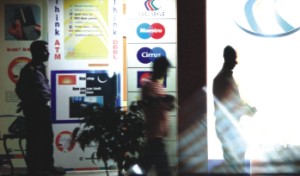 |
| Muggers are using newer and more aggressive techniques. |
“Three days after I was attacked, I went with my brother to the police station. The second officer took down my statement and I was told to file a General Diary. They asked me if I could remember the registration number of the taxi cab. Of course I couldn't. But I gave them a description of the driver, and the stolen property. They said they would call me if anything turned up. They didn't seem too hopeful.”
The problem is reaching alarming proportions. Police sources say more than a hundred groups comprised of about 1,200 muggers are active at around 200 spots in the capital. Scores of people are attacked every day. Almost everyone has a friend or relative who has been mugged or hijacked. Many have lost their lives. Horror stories abound.
“It used to be that being mugged was a rare accident,” says Dilara Begum, a boutique shop owner in Dhanmondi. “If you stayed away from the bad areas, you were safe. But these days if you venture out alone after dark, you can expect to be mugged. It has happened to me, my husband and my son. My son was mugged twice while returning home from his university.”
No area is immune. While certain parts of Agargaon, Mirpur, Jatrabari, and Tejgaon have long been known as trouble hotspots, recent trends have seen the affluent neighbourhoods of Gulshan, Banani and Dhanmondi being targeted.
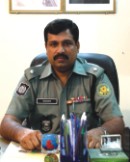 |
 |
| Md Kamal Uddin, OC, Gulshan Thana |
SM Shiblee Numan, OC, Ramna Thana |
“It is true that the muggers have become more mobile,” says Md Kamal Uddin, Officer in Charge (OC) of Gulshan Thana. “Previously mugging used to be pretty much localised. But nowadays the use of vehicles, often stolen ones, has added a new dimension.”
The technique is fairly straightforward. The criminals cruise the area in cars and microbuses looking for victims. Once they spot someone on a rickshaw or walking alone, they will drive up to the victim and rob them at knife point. Firearms are also frequently brandished. Taxicabs and auto rickshaws are used to target unsuspecting passengers.
“This used to be a very safe area,” laments Muhiuddin Chowdhury, a resident of Banani Road 11. “These days no one is safe. If I go out after dark, I leave my watch behind and carry very little money. I avoid taxis or CNGs. I would much rather travel on a bus with standing room only than take a black cab at night.”
Along with the areas, the profile of victims has also changed. The typical victim of muggers used to be a lone female or elderly man walking in a deserted area. These days, young men and women are most frequently targeted -- mainly because they carry small items of value such as mobile phones and iPods.
“If I take an auto rickshaw at night, I sit at the very edge of my seat, ready to jump out if the CNG stops,” comments Farhan, a student of North South University. “It is dangerous out there.”
 |
| Munirul Islam, Deputy Commissioner, Detective Branch |
Despite the statistics and the preponderance of anecdotal evidence, the strange paradox is that this crime wave is not registering on the radar of the law enforcement agencies -- at least not officially. Speaking to the Star Magazine, the Officers in Charge (OC) of several Thanas said there were no muggings in their area since no cases had been lodged. The main reason for this great divide between the official view and the ground reality is the fact that most victims do not report to the police.
“There is a huge gap between the stance of the police and the perception of the public,” says Hossain Khaled, former President of the Dhaka Chamber of Commerce and Industries (DCCI) and Corporate Director of Anwar Group. “Most people feel that it is a waste of time to go to the police station. Many even fear they will be harassed. There is a strong belief that many of the criminals have political shelter and their reach is longer than the arm of the law. It is up to the government to prove this wrong. If the people lose faith in the law, good governance becomes impossible.”
Akmal, 34, was mugged on the airport road while in a taxi cab and left near Uttara. Dazed and shocked, he found a policeman with a walkie talkie. When he reported the crime, the police officer asked if he could remember the number of the taxicab. Akmal couldn't, but he gave a detailed description of the men and the stolen property.
“The officer didn't seem very interested,” recalls Akmal. “I asked him to alert any police patrols near airport entrance with the description, but he wouldn't. He said it was useless without a number, and that I should go home.”
 |
| Hossain Khaled |
It is a catch 22 situation. Monirul Islam, Deputy Commissioner, Detective and Criminal Intelligence Division of the Dhaka Metropolitan Police admits that the prevailing public perception that the police are either unwilling or unable to fight street crime is hampering efforts to bring the situation under control. But he says it is the duty of the public to come forward.
“If the crime is not reported, how can we catch the criminals?” asks the DC, DB. “It is true that people are not comfortable coming to the police, but that must change. Despite limitations we are trying to project a people-friendly image.”
In a stark reminder of how widespread the problem has become, Swiss Ambassador Dora Rapold, who is also the Dean of the Diplomatic Corps, wrote to the Ministry of Foreign Affairs in the first week of May informing the ministry that foreigners and diplomats, especially women, are becoming victims of mugging and other crimes.
“There seems to be a pattern to the incidents that expatriates, particularly females, are made target. The fact of the use of firearms and knives in the incidents is extremely worrying and it has led to serious injuries to the victims in some cases,” said the letter. Most of the incidents took place in the Gulshan and Baridhara areas.
Md. Kamal Uddin, newly appointed OC of Gulshan Thana, says the police are pulling out all the stops to bring the situation under control, and are succeeding. “We have increased the number of check posts and also the number of motor cycle patrols. The situation is under control. There were 10 cases of mugging in June. In July there were only 4. Despite resource limitations, we are vigilant 24/7.”
 |
 |
| There is disparity between the viewpoints of the police and the public. |
The police say despite resource limitations they are vigilant against muggers and drug peddlers. |
His words are echoed by S M Shiblee Noman, Officer in Charge of Ramna Thana. “We have mounted a strong operation to stop street crime. It will be conducted in 3 phases. From August 3 to August 13 we are conducting an all-out drive against street crime. This includes capture of members of Aggyan Party (groups that knock out their victims using chemicals) and Molom Party. Then we will conduct a drive against drug trafficking. Then will come a drive against certain godfathers of crime.”
 |
 |
| Check posts have had limited success in combating street crime. |
Affluent neighbourhoods have become targets for drive-by muggings in recent days. |
The police officers point to arrests they have made in recent days. They say severe shortages in men and vehicles are hampering their efforts.
 |
| Business leaders say a stable law and order situation is necessary to attract investment. |
Deputy Commissioner Monirul Islam says the police are taking initiatives such as the community police scheme which seeks to involve the community in crime fighting. He also mentions other positive steps such as dividing up the Thana into zones and assigning a team led by a Sub Inspector to oversee it.
“An SI will contain crime in his or her assigned area. The SI will also settle long-standing problems existing in the area by holding arbitrations among feuding groups or individuals. Besides, DMP is going to strengthen police patrolling, forming at least three more motorbike patrol teams in each police station. In each patrol team there will be four police personnel with two motor bikes.”
He also promised pro-active undercover schemes including Burqa squads where police personnel will don Burqas in an effort to nab criminals.
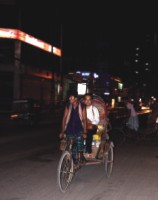 |
| Street crime makes it dangerous for commuters at night. |
It remains to be seen whether such initiatives will translate into solid gains on the ground. Many critics say the police are preoccupied with high profile crimes such as murders and are not focused on fighting street crime. Too much focus on “VIP duties” is also blamed for over stretching police resources.
“It is all about the will to fight crime,” says Hossain Khaled. “The mechanism is there. The police have information about the gangs. A zero tolerance approach is needed from the government.”
The DMP have made it mandatory for all taxi cabs and CNGs to display Police Control Room numbers that passengers can call in an emergency. When the emergency number 01199806111 was called by the Star Magazine at 2.10 AM on August 10, it was switched off.
“Mugging incidents make us fearful of strangers and afraid to go out at night,” says Absar Uddin. “They have taken away our peace of mind.”
In many ways, that is the biggest loss of all.
Copyright
(R) thedailystar.net 2009
